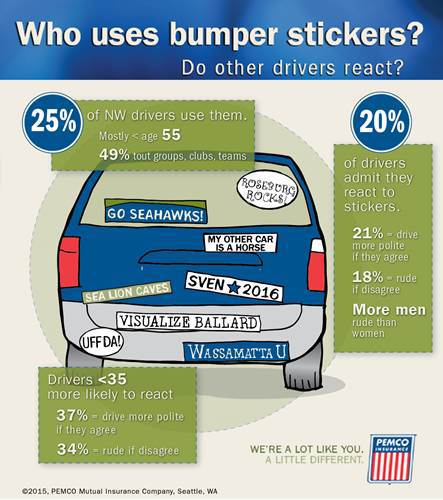If dog is your co-pilot, you have a “baby on board,” or you’re proud of your alma mater, chances are you’re among the one in four Northwest drivers who, according to the latest PEMCO poll, have an appetite for adhering personal proclamations to the cars they drive.
According to the PEMCO Insurance Northwest Poll, 25 percent of drivers in Washington and Oregon say they adorn their vehicles with bumper stickers or car magnets. And of those, men and women under 55 are almost twice as likely as their older counterparts to have bumper stickers (30 percent vs. 16 percent).
In fact, women in Washington, those who are younger, and people with children in the household are the likeliest bunch to accessorize their bumpers with personal messages, the poll revealed.
Given that trend, drivers might expect to see more family-related sentiments than other types of bumper stickers, but according to the poll, messages proclaiming groups, clubs and sports teams are by far the most popular theme in the Northwest – about half (49 percent) of drivers personalize along those lines.
Conversely, just 22 percent use bumper stickers to communicate something personal about the vehicle’s occupants, and just 8 percent say they display those trendy stick-figure decals to represent their families.
“Given the popularity of teams like the Seahawks and Trailblazers, along with our pride for local schools and universities, it’s not surprising that drivers choose bumper stickers touting teams, clubs and groups, over things like humor or politics,” said PEMCO spokesperson Jon Osterberg.
PEMCO’s data show that Northwest drivers are more than twice as likely to display group-based stickers compared to messages that convey a favorite phrase, political stance or family makeup. Less popular than bumper stickers, though, are another form of car customization – personalized vanity plates. Just 7 percent of Northwest drivers have vanity license plates, and only one in 10 opt for a plate with a specially designed background.
Of this niche, men are more likely than women to sport a custom plate – 18 percent of men and just 10 percent of women customize with tailored text or a specially designed background.
While some bumper stickers and custom license plates may convey a provocative tone, PEMCO’s poll finds that most drivers (77 percent) are unfazed by those messages, at least when it comes to how they react to them while driving.
Still, about 20 percent of Northwest motorists admit they change their driving behavior depending on whether they agree or disagree with the sentiments on bumper stickers or license plates. According to the poll, 21 percent of drivers say they’re more polite to drivers sporting messages they agree with, while 18 percent admit they’re at least a little discourteous to drivers whose messages they oppose.
The poll found that men are equally as likely as women to be at least slightly more courteous when they see messages they agree with, but they’re more discourteous when they see messages they disagree with (23 percent of men vs. 13 percent of women).
Northwest drivers under age 35 also are significantly more likely than their older counterparts to change their driving behavior based on their reaction to bumper stickers or personalized plates.
Younger drivers are more than twice as likely to be more polite when they agree with messages (37 percent vs. 14 percent), and they’re three times as likely to be more discourteous when they disagree with messages (34 percent vs. 11 percent).
“While the poll generally supports that your bumper sticker won’t earn you special treatment on the road, you might have the best luck merging in front of men or drivers under 35, but only if they share your sentiment,” Osterberg said.
For a complete summary of PEMCO’s poll results, visit www.pemco.com/poll.


